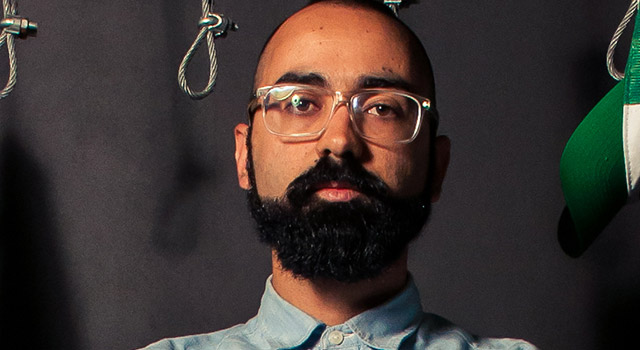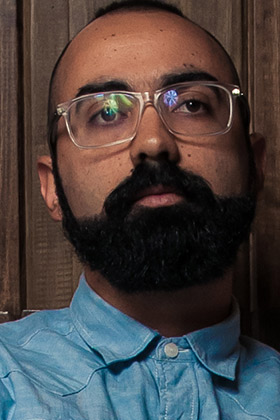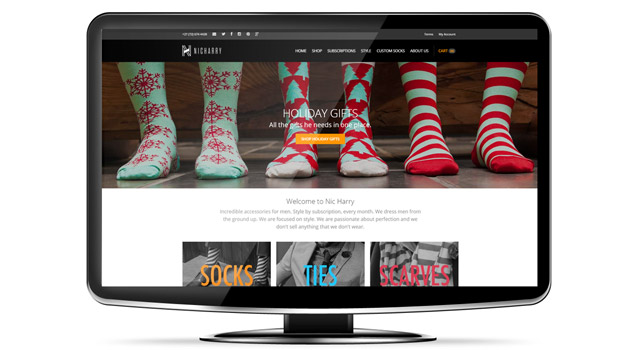
NicSocks started as a unique and highly niche e-commerce business that focused on making and selling designer socks for men.
But the business, started by Nic Haralambous, is now turning into a broader men’s fashion play as demand for clothing accessories catches up with global trends.
The Johannesburg-raised Haralambous, now 30, was exposed to computers and an entrepreneurial mindset from an early age. But he was never pushed into the life of an entrepreneur. His passion was for technology. He started coding when he was just 10 and built his first website when he was 12.
After school, Haralambous studied journalism, philosophy and politics at Rhodes University and started his media career at Talk Radio 702 while finishing his degree.
He recalls meeting his future business partner, Vincent Maher, while at Rhodes. Maher was a lecturer in the journalism department, teaching a new media course. Haralambous hadn’t taken the course, but they started working together from his third year at university in 2005.
After completing his degree, Haralambous took up a post at the Financial Mail, soon becoming editor for FM Campus, a supplement aimed at students. He says he worked hard to drag the FM into the digital world, but was “met with some resistance”.
In early 2008, he moved to the Mail & Guardian as mobile editor and got the opportunity once again to work with Maher.
After a short stint at the M&G, Haralambous moved to Vodacom with Maher to start work on a social network called The Grid, a location-based social network for feature phones. “It was basically Foursquare before Foursquare was around.”
Haralambous and a team at Vodacom also built a massively multiplayer online location-based mobile game called Legends of Echo, which was “a lot like World of Warcraft for your feature phone”.
It was at Vodacom that Maher and Haralambous decided they had enough of making other people wealthy and set out on their own.
 That December, in 2009, the two started building a mobile social network builder, which would eventually become Motribe. Haralambous was a co-founder and became the CEO. The following year, Haralambous and Maher moved to Cape Town and secured funding from 4Di Capital to further expand the business.
That December, in 2009, the two started building a mobile social network builder, which would eventually become Motribe. Haralambous was a co-founder and became the CEO. The following year, Haralambous and Maher moved to Cape Town and secured funding from 4Di Capital to further expand the business.
But Motribe hit a rough patch, which forced it to retrench staff. “I learnt some lessons,” says Haralambous.
It was during this time, with Motribe having to claw its way back financially by doing agency-type work and building mobile networks for businesses, that Haralambous and his team struck up a relationship with Mxit, the Stellenbosch-based instant messaging platform and social network.
Motribe created a dating application as well as an Instagram-like app for Mxit, which got the start-up almost a million users in 30 days. It was then that Mxit realised there was value in what Motribe was building.
“They made an offer [to buy Motribe] that the collective [of shareholders] could not turn down.”
These were to prove to be trying times for Haralambous. The 2012 Mxit offer led to a fall-out between Haralambous and Maher, with the two parting ways.
“Business partners need to be aligned constantly when running a business because its like running a household,” says Haralambous. “It is emotional and it is intense.”
At the core of the dispute was the fact that Maher wanted to sell the business to Mxit, while Haralambous wanted to keep building it. “Ultimately, we came to an agreement that we would sell. The truth is you can’t keep building a business if the partners want different things.”
Socks for sale
For Haralambous, NicSocks — recently renamed Nic Harry — happened almost by accident.
“With NicSocks, I wanted to prove to South Africans that you can spend a very little amount of capital and start something that is worth something.”
By that time, Haralambous was a fan of wearing brightly coloured socks. “They kind of became my thing in the local space.”
But the quality he was getting from international suppliers was poor, so he decided to produce and sell his own.
“The idea was that I wanted to prove that anyone can start a business with R5 000 or less, that it can be set up in six weeks or less, and that it can generate meaningful revenue in 30 days or less.”

For Haralambous, the thinking was that if he could not do it with socks, he would write off the five grand and move on to the next thing, following the same model.
But NicSocks went on to make R30 000 in revenue with its first batch of socks, which he sold via the NicSocks website and City Mob, the online retailer that later become Superbalist and which was acquired out by Takealot.
Haralambous ploughed the money back into the business and it just kept rolling from there.
Since then, NicSocks (now Nic Harry) has broadened its focus to take advantage of the expected boom in online fashion retail. Haralambous says the European market has enjoyed strong growth in this area in recent years, and this is likely to come to South Africa, too.
But working with the South African manufacturing industry is “brutal”, he says. “The truth is if it wasn’t brutal anyone would do it.”
There are “fundamental issues we are facing in the country with regard to manufacturing”.
“The fact that our textile industry has tanked is an absolute nightmare. We had so much potential and the frustration is that local big companies can easily find cheaper and better suppliers overseas, which then is the vicious cycle of perpetuating the problem.”
To overcome the shortcomings, Haralambous decided to sell limited edition runs to ensure his suppliers could keep up with demand. “I don’t see any government organisation having the foresight and the execution skills to implement the plans required to rectify the textile industry.”
For the future, Haralambous simply hopes to keep up the fast pace of growth. Revenues through his website have risen by 262% in the past year. Now he’s planning an aggressive push into retail, with Nic Harry fashion accessories being stocked in Eurosuit stores around the country and in boutique outlets in Pretoria, Cape Town and Johannesburg.
“We also hope to grow into in-flight sales with some of the airlines’ shopping carts.” — © 2014 NewsCentral Media




